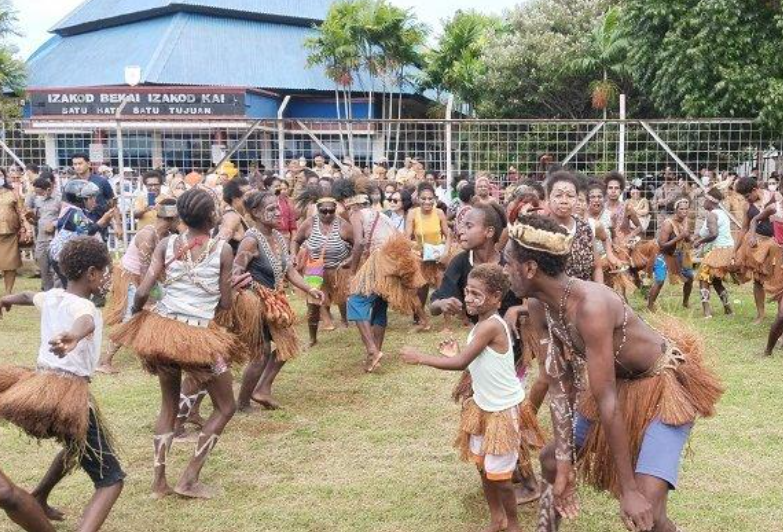Papuaaround.com – In the lush landscapes of Papua, where tradition intertwines with the rhythm of daily life, the Kasara celebration stands out as a vibrant testament to the region’s rich cultural heritage. This annual event is not only a showcase of the local customs and artistry but also a celebration of community, resilience, and the deep connection that Papuans maintain with their ancestral roots.
The term “Kasara” is derived from the local language, signifying “celebration” or “festival.” Traditionally, this event is marked by a series of rituals and activities that pay homage to the ancestors and express gratitude for the blessings of nature. The Kasara celebration typically coincides with the harvest season, serving as a way to honor the land and the fruits it yields.
Communities across Papua, including various tribes such as the Dani, Asmat, and Yali, each have their unique interpretations of the Kasara celebration. While the specifics may vary, the overarching themes of gratitude, unity, and cultural expression remain consistent throughout the region.
The Kasara celebration usually spans several days, with each day dedicated to different rituals and activities. Preparation begins weeks in advance, as community members collaborate to organize the event. This teamwork fosters a sense of belonging and strengthens social bonds within the community.
On the first day of the celebration, participants gather to offer prayers and perform rituals that seek blessings from ancestral spirits. This ceremonial opening is often led by respected elders, who invoke the names of ancestors and express appreciation for the resources provided by the land. Offerings of fruits, flowers, and traditional foods are placed at sacred sites, symbolizing respect and gratitude.
As the celebration unfolds, the community engages in a variety of activities, including traditional dance performances, music, and storytelling. Dancers adorned in vibrant costumes embody the spirit of the ancestors, telling stories of bravery, love, and the natural world through intricate movements. The rhythmic beats of traditional instruments, such as the tifa drum, resonate throughout the gathering, creating an atmosphere of joy and unity.
Read also: The Legend of Creation! Papua’s Deep Connection to Nature
Another highlight of the Kasara celebration is the culinary showcase, where community members prepare traditional dishes using locally sourced ingredients. This feast not only satisfies hunger but also serves as a platform for sharing culinary traditions with younger generations, ensuring that cultural knowledge is passed down.
At its core, the Kasara celebration is about fostering community cohesion and reinforcing cultural identity. In an era where globalization and modernization pose challenges to traditional practices, events like Kasara play a crucial role in preserving the cultural fabric of Papuan society.
During the celebration, younger generations are encouraged to participate actively, learning about their heritage through direct involvement in rituals and activities. Elders share stories that convey moral lessons and historical significance, deepening the understanding of cultural values among the youth. This transmission of knowledge is vital for sustaining cultural identity and ensuring that traditions endure in the face of change.
Moreover, the Kasara celebration serves as a reminder of the interconnectedness between people and nature. Through rituals that honor the land and its resources, participants are reminded of their responsibility to protect the environment for future generations. This emphasis on stewardship is especially relevant in today’s context of environmental challenges and climate change.
Despite its significance, the Kasara celebration faces challenges in the modern world. The pressures of urbanization and cultural assimilation can lead to a decline in participation and interest among younger people. Additionally, external influences may threaten the traditional practices that define the Kasara celebration.
To combat these challenges, community leaders are actively promoting the importance of the Kasara celebration as a vehicle for cultural education and environmental awareness. Initiatives aimed at engaging youth, such as workshops, cultural exchanges, and community festivals, are being implemented to reignite interest and pride in traditional practices.
The Kasara celebration is a vibrant reflection of Papua’s cultural richness and community spirit. It serves as a platform for honoring the past, celebrating the present, and envisioning a sustainable future. By embracing their heritage through events like Kasara, the people of Papua not only preserve their unique cultural identity but also promote a deeper understanding of the interconnectedness between culture, community, and nature. As this celebration continues to thrive, it offers hope and inspiration for future generations, reminding us all of the importance of honoring our roots while navigating the complexities of modern life.

